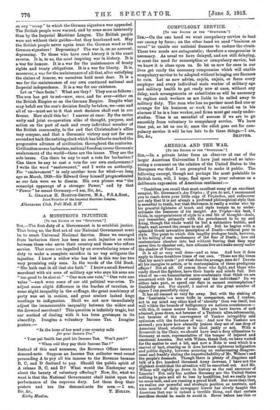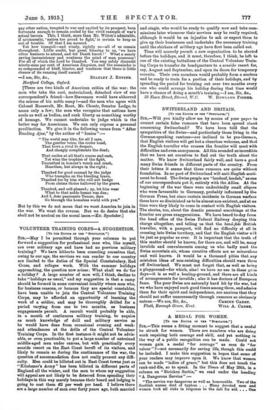AMERICA AND THE WAR.
[To ras Emma or sax "BracrAroa."1
Sis,—In a private letter from an observer at one of the larger American Universities I have just received so inter- esting a comment on the relation of the United States to the European war that I am prompted to make it public. The following excerpt, though not perhaps the most palatable to British taste, will, I hope, find apace in your columns as a deliberate expression of American sentiment :— "Doubtless you recall that most excellent essay of an excellent essayist, Mr. Stevenson's Ass Triplex. if you do not, I recommend you to reach down your little copy of Firgiaibus, and rediscover not only that it is not alwajs a profound philosophical style that is essential to truth, but that Stevenson is really a writer who by his graceful lightness of touch and style tempts us to under- estimate the keenness of his insight. Ass Triples—his bast, I think, in appropriateness of style to a real bit of thought—deals, you remember, primarily with the preachment to be up and doing, though the whole world be but a subjective bubble, and Death wait around the corner to end all. But he begins with a splendid Greek invocative description of Death—without peer in style. The point to which this lengthy prologue tends, however, is his telling of our carelessness of the fear of Death ; how old centenarians clamber into bed without fearing that they may never live to clamber out; how citizens live and make merry under the shadow of Vesuvius.
It is all so very well done—and so true. And how it does apply to these troublows times of our own. 'These are the times that try men's souls!' yet what does the average man do Devote all his energies to action, or to contemplation of these prodigious affairs ? Not at all. Of course those who fight, and those who really direct the fighters, have their hands and minds full. But what of us—we humanitarian non-combatants that think we are concerned with the fate of society and the individual? Do we either take part, or spend our days in earnest contemplation P Decidedly not For myself, I marvel at the great number of cigars I can peacefully enjoy. It has all seemed so very far away. But with the sinking of the ' Lnsitania '—a mere trifle in compariaon, and. I confess, not in my mind any other kind of ' atrocity ' than war itself, but well within the bounds of belligerency we nations countenance— with this, it comes nearer home. Men you have known of and admired, gone down, not because of a Teutonic ultra-inhumanity, but because of the convergence of Yankee intrepidity and optimism with the fortunes of war. • And now the Yankees are aroused ; you know how absurdly jealous they are of one drop of American blood, whether it be shed justly or not. With a Roosevelt in the Chair, we should have sent a fiery ultimatum to Germany at once, ropreeentative of the temper of injured and emotional America. But with Wilson, thank God, we have waited for the matter to cool a bit, and now a Note is sent which is a marvel of tact, steering ax it does between righteous indignation and politic dignity, between arousing an embarraaring disagree- ment and frankly stating the imperturbability of Mr. Wilson's and the people's demands. 'Though there is plenty of Jingoism and talk of a five hundred thousand Army increase, I have not the slightest doubt that the situation will be smoothed out. And Mr. Wilson will rightly go down in history as the real successor of Lincoln ! Not only has neither Germany nor the United States nothing to gain and all to lose by hostilities, but we really have no cases belli, and are tanning a grand bluff. But more than that, we realize our powerful and strategic position as neutrals, and nine months of daily newspaper horror has slowly taught the American that war is indeed a terrible thing, and that certain sacrifices should be made to avoid it. Never before has this or
tiny other nation, tempted to war and excited by its prospect, been fortunate enough to remain cooled by the vivid example of war's actual terrors. This, I think, more than Mr. Wilson's admirable, if aristocratic, 'nation too proud to light,' is certain to keep us out of trouble. Of that I ace assured.
Yet how tranquil—and wisely, rightly so—all of us remain throughout. Little credit, but great blessing to us, ' we have other business to attend, and 'let Death knock ! ' What a sanely saving inconsistency and weakness the mind of man possesses ! For all of which the Lord be thanked. You may safely discredit ninety-nine per cent, of American Jingoism, and the remainder is so compounded of bluff, bluster, and weakness that there is little chance of its running itself amuck."
[There are two kinds of American critics of the war: the men who take the cool, materialized, detached view of our correspondent's friend—how Stevenson would have abhorred the misuse of his noble essay !—and the men who agree with Colonel Roosevelt, Mr. Root, Mr. Choate, Senator Lodge, to name only a few; the men who recognize that nations have souls as well as bodies, and rank liberty as something worthy of homage. We cannot undertake to judge which is the better way for Americans. We can only express a personal predilection. We give it in the following verse, from "After Reading Ajax," by the author of " Ionica " "The world may like, for all I care, The gentler voice, the cooler head, That bows a rival to despair, And cheaply compliments the dead; That smiles at all that's coarse and rash, Yet wins the trophies of the fight, Unscathed in honour's wreak and crash, Heartless, but always in the right; Thanked for good counsel by the judge Who tramples on the bleeding brave, Thanked too by him who will not budge From claims thrice hallowed by the grave.
Thanked, and self-pleased; ay, let him wear What to that noble breast was due ; And I, dear passionate Tearer, dare Go through the homeless world with you."
But by this we do not mean that we want America to join in the war. We want the reverse. But we do desire that she shall not be neutral on the moral issue—ED. Spectator.]



































 Previous page
Previous page